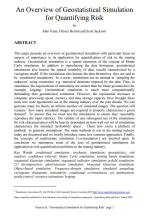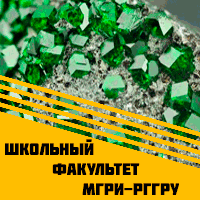Добрый день, Коллеги. Важное сообщение, просьба принять участие. Музей Ферсмана ищет помощь для реставрационных работ в помещении. Подробности по ссылке
An overview of geostatistical simulation for quantifying risk / Обзор геостатистического моделирования для количественной оценки риска
This paper presents an overview of geostatistical simulation with particular focus on aspects of importance to its application for quantification of risk in the mining industry. Geostatistical simulation is a spatial extension of the concept of Monte Carlo simulation. In addition to reproducing the data histogram, geostatistical simulations also honour the spatial variability of data, usually characterised by a variogram model. If the simulations also honour the data themselves, they are said to be ‘conditional simulations’. In a sense, simulations are an attempt at ‘sampling the unknown’ using constraints, e.g. statistical moments imposed by the data. Thus, in simulation, the requirements of stationarity are stricter than for linear geostatistics (for example, kriging). Geostatistical simulation is much more computationally demanding than geostatistical estimation. However, the exponential increases in computer processing speed, memory and data storage capacity have brought these tools into wide operational use in the mining industry over the past decade. We can generate many (in theory an infinite number) of simulated images. The question still remains: ‘how many simulated images are required to properly characterise a given domain?’ To answer this we must test the simulations to ensure they reasonably reproduce the input statistics. The validity of any subsequent use of the simulations for risk characterisation will be heavily dependent on how well our set of simulations characterises the intended ‘probability space’. There now exists a plethora of methods to generate simulations. The main methods in use in the mining industry today are discussed and we briefly introduce some less common approaches. Finally, the concepts of multivariate simulation (‘co-simulation’) are touched upon. In conclusion we summarise some of the uses of geostatistical simulations for application to risk quantification problems in the mining industry. <...>




